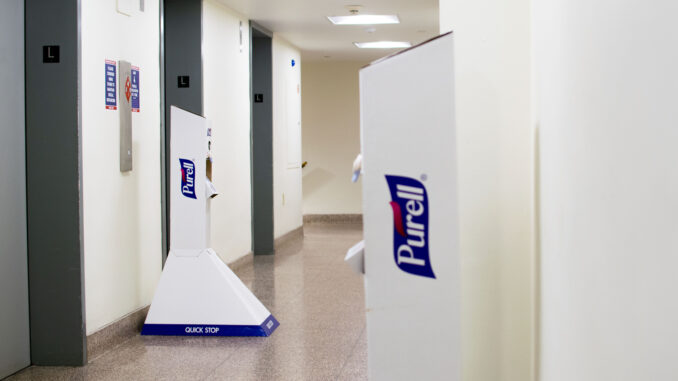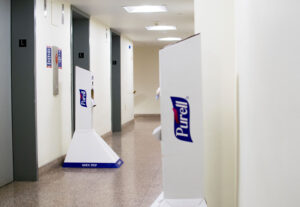
8/27/2020
 Kellen Stepler | editor-in-chief
Kellen Stepler | editor-in-chief
As summer faded and the academic year began to come into fruition, Duquesne students received numerous emails from University administration, but there’s one that definitely stood out — the Aug. 20 email from Duquesne vice president of student life Douglas Frizzell, stating a ban on “all off-campus programs and social gatherings.”
Then, on Aug. 20, Duquesne vice president of student life Doug Frizzell sent a mass email to the Duquesne community stating a ban “on all off-campus programs and social gatherings.” All social interaction in off-campus housing may only include housemates and family members, and all other social gatherings are prohibited, constituting a violation of the COVID-19 policies for students.
After a flurry of confusion between students, that message prompted a follow-up email sent on Monday from Frizzell, clarifying some rules of the ban.
“Duquesne University is a private institution of higher education that can and does set the terms under which people can study or participate in activities on its campus, live in its residences, or be employed,” Frizzell wrote in the follow-up. “Its policies are informed by recommendations from the Centers for Disease Control and Prevention, the Allegheny County Health Department, and close professional monitoring of conditions in our region.”
Clarifying the ban, Duquesne vice president of marketing and communications Gabriel Welsch told The Duke that “common sense is very important.”
“The overall goal is continued safety during the pandemic, and the intention is to prevent the sorts of gatherings — particularly parties — that tend to involve large groups of people, without masks, whose behaviors may be less cautious and involve people with whom you do not typically associate and, particularly, who are outside of your R-PODs,” Welsch said.
“Students visiting family, conducting community service or working at a job, as a few examples, with safety measures in place, including masking, social distancing and proper hygiene, should be fine,” Welsch said. “Completing the daily health screen questions and ensuring continuous proper observance of proper safety measures is key and necessary as part of the new Student Code of Conduct measures to address the COVID-19 pandemic.”
Welsch said that despite it being very early in the academic year, Duquesne students and employees have been holding not only themselves, but others accountable regarding current policies for mask-wearing, social distancing, practicing good hygiene and adhering to the Protect Duquesne Pledge.
“Individuals are reporting violations to the university leadership, academic deans and faculty and leadership across the division of student life,” Welsch said.
Duquesne senior business management major Jonny Geisler, who lives off campus with Pitt students, thinks more clarification regarding Duquesne’s COVID-19 guidelines is necessary.
“I fully understand the intentionality behind it, and I agree with the intentionality without a doubt,” Geisler said. “I think if we lack clarification, that will cause confusion. For example, I wasn’t sure if I was able to attend church or not, based on the rules and regulations.”
Giesler also feels for the incoming freshmen, who are beginning their college journey like no other.
“I think it’s extremely hard for freshmen — I think it’s one of the worst-case scenarios,” Geisler said. “Coming in as a freshman, that’s where you meet everyone, that’s where you get your friends. Those first couple of weeks are really make it or break it for freshmen, and to come in and be told that you can really only hang out with your roommate, and maybe a few other people — it’s just not the same. It’s a lot more isolating.”
Duquesne unveiled a master plan on July 10 to reopen campus, composed of seven different task forces — health and safety protocols, academic affairs and online learning, faculty and staff re-entry, housing and auxiliary services, student success, athletics and finance and budget.
“The Master Plan … reflects measures the University has taken to create a structured campus environment, allowing for face-to-face and hybrid classes, adapted living conditions and other necessary changes, while making it possible to be present on Duquesne’s campus and earn a high-quality education,” Welsch said.
14 days later, Duquesne announced four requirements for students to return to campus. Updated information from the university regarding COVID-19 can be found on https://covid19.duq.edu.
“The COVID-19 Planning and Information website includes news and updates, resources and a very comprehensive frequently asked questions section that addresses both COVID-19 and university operations,” Rose Ravasio, Duquesne media and communications manager, said. “Duquesne’s COVID-19 Planning and Information website is definitely one you’ll want to bookmark to make it easier to visit more often.”
Ravasio said that Duquesne Health Services will provide “relevant statistics” regarding COVID-19 each week to senior administration, and the university will report the number of confirmed positive cases on its COVID-19 planning and information website, and will update that number as it receives reports. As of Tuesday, Aug. 25, that information has not been listed on the website.
In the July 24 announcement, Duquesne shared preventive measures for those returning to campus. Masks are required in all public spaces — inside and outside — and everyone will practice social distancing. Students living on campus are grouped into R-PODS to limit contact to their group initially, avoid meeting in large groups and signage indicating foot traffic patterns have been placed all over campus.
Additionally, Pennsylvania Governor Tom Wolf announced on Aug. 4 $28 million in aid to state colleges and universities to support health and safety plans. Duquesne received $133,000.
“The funding provided helped to offset the considerable costs the university incurred in that area, including everything from PPE, to testing, to contracting for quarantine beds, to Plexiglas and on,” Welsch said.
